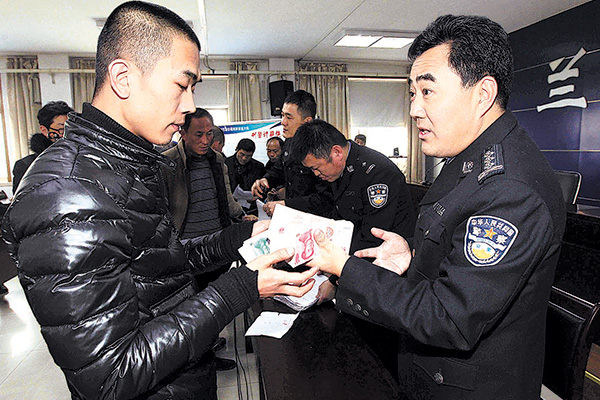
Police officers in Linyi, Shandong province, help migrant workers get payment that had been withheld by their employers last month.[Photo/China Daily]
The State Council, China’s Cabinet, approved two important five-year plans on Feb 3 to enhance supervision of food and medicine safety amid the government’s efforts to better protect public health.
The two plans, passed at an executive meeting presided over by Premier Li Keqiang, outlined the government’s blueprint for ensuring food and drug safety during the 13th Five-Year Plan (2016-20).
According to the plans, the government will keep a close eye on key areas such as schools and roadside vendors to ensure that the food they sell is safe. The authorities will enhance supervision guarding against excessive pesticide use and misuse of food additives.
The government will speed up the establishment procedures to make sure that all phases of medicine production and sales are retraceable, and the production and sale of counterfeit medicine will be severely punished.
Sample testing will cover all kinds of food, blood products, vaccines and essential medicines to improve risk surveillance and assessment, according to the plans.
The government will also speed up the amendment to the national standard on food safety and raise the safety standard of food, medicine and cosmetics.
The executive meeting announced strict measures to protect the legal interests of migrant workers who were not paid by their employers.
Provincial governments will be held accountable for ensuring the timely payment of migrant workers. Provinces having large numbers of migrant workers are urged to help workers get their pay on time.
Companies that fail to pay wages promptly will be put on a blacklist that will be published at regular intervals. Their market access will be limited in the future.
“China has made impressive progress largely thanks to the effort and contribution by our migrant workers,” the State Council said in a statement.
Huang Leping, director of Beijing Yilian Legal Aid and Research Center of Labor, said that Premier Li has paid attention to the legal interests of migrant workers, showing the central government’s concern over the suffering of the grassroots.
Those who refuse to pay the migrant workers should face tougher punishment in keeping with the Criminal Law, which rules that employers can face up to seven years imprisonment if they maliciously delay or refuse to pay workers, said Huang, whose NGO has helped more than 140,000 employees, mostly migrant workers, to protect their rights.
Compared with employees in many other occupations, such as teachers, migrant workers are more vulnerable to the infringement of their rights because they have little knowledge and few channels to safeguard their rights, he added.
